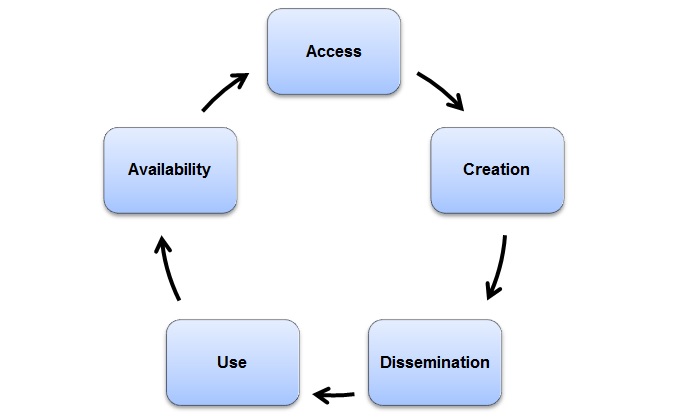Universities must think about improving all stages of the research cycle
This post was originally published on the ACU’s ‘The world beyond 2015 – Is higher education ready?’ campaign website on 19 November. The campaign aims to raise awareness of how higher education can and should respond to global development challenges ahead of the Millennium Development Goals expiring in 2015. Visit the site to get involved and contribute your thoughts.
This post was written by Jonathan Harle and Sue Corbett.
‘Putting research knowledge at the heart of development’ is the aim of everything we do at INASP, and will be critical if the world is to respond to the challenges of a post-2015 world. Our focus is on the use of information and the generation of knowledge.
If the countries with which we work – currently 21 in Africa, Asia and Latin America – are to take control of their own development, and to generate the ideas and the policies that they need to do this, then it’s clear to us and our partners that higher education and research will need to play a central role. But what does this mean in practice? What do universities need to do to realise these ambitions and to serve the needs of their communities? How can we support this?
We find the concept of a research cycle a helpful way to illustrate what we do: research is done, it’s published and disseminated, it’s made available to others, accessed by researchers and students, and then used to do new research. There’s also a further critical off-shoot here: how research gets taken up outside of academia, by practitioners and policymakers and other users.
Firstly, universities must secure good access to information, particularly the high quality, peer-reviewed work found in scholarly journals and other academic publications. Without this they can’t provide their students with a good learning environment, their academics can’t keep up to date with the latest developments in their disciplines, and they can’t design and undertake their own research. Universities need to recognise the critical role of libraries in purchasing and managing this information and to support them with funding and IT staff.
While universities are often in competition with each other, this is an area where they can achieve much more when they work together. In Ghana and Kenya, for example, strong consortia are providing excellent support to their universities and colleges. But as their libraries strive to offer more, university leaders need to support them too – investing in professional skills, supporting leadership development, and helping them to make the case to national funding agencies.
Secondly, universities need to make a sustained investment in the skills of teachers, researchers and students. This is not just about assimilating the latest facts on a particular topic – it is also the critical thinking skills that graduates will need in employment and researchers will need to generate new knowledge. Our AuthorAID project uses online mentoring and a combination of face to face and e-learning to help researchers develop their scientific writing skills, but we’re also exploring how we can adapt this approach for some of these other critical academic skills, as well as work with some of our partners to embed this in their own training programmes.
Thirdly, for research to be used, it needs to be visible. Through our Journals Online programme we work with journal editors to make developing country work more visible and more accessible, providing an online publishing platform and advice on publishing technologies and journal quality.
Finally, for research to be valued, and for it to address real-world problems, it needs to be used by those outside of the academic world. Some of this depends on researchers being pro-active, with support from their universities, and some of it depends on these end users seeking it out, and understanding how to use it. Our evidence-informed policy making programme is currently working with partners in Ghana, Zimbabwe and South Africa to develop ‘evidence skills’, strengthen ‘evidence processes’ in policy departments, and encourage the engagement of citizens, media and civil society.
So universities have a vital role to play now and beyond 2015. But realising this will mean investing in some very ordinary things – and particularly the capacity of their most valuable resource: their people.






I always like to see the ‘research cycle’ for it encapsulates our work 🙂 Just wondering – do librarians in developing countries play a role in advocating or monitoring the use of open access publications?
Hi Ravi, yes, I’m sure they do – and perhaps more than just advocating and monitoring, but demystifying and explaining too so that researchers and management gain a better understanding of what OA really is. And many are already doing this as our OA competitions have shown! cheers, Jon